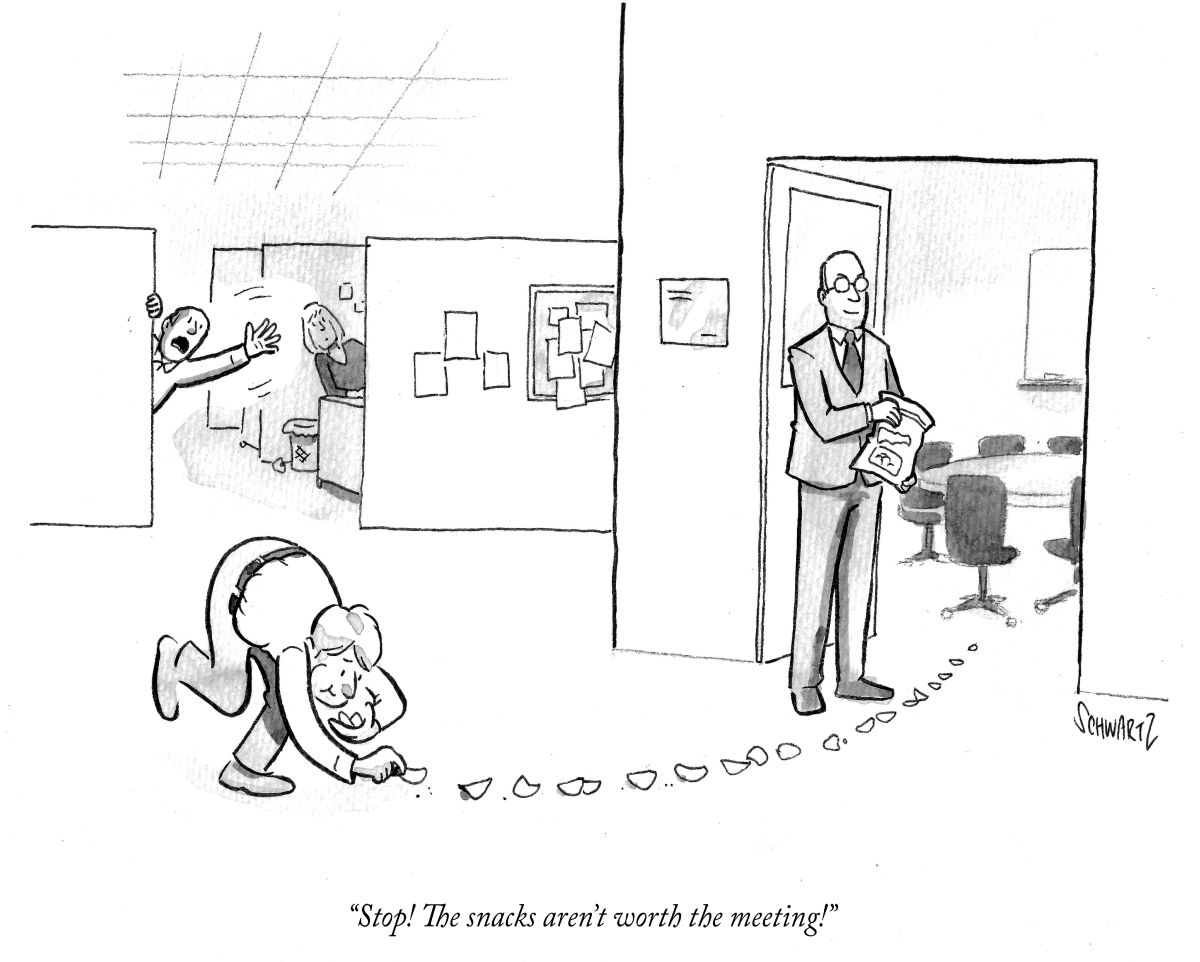Workplace trends
Employment
Gen Z is struggling in the workplace
Many young workers these days feel so unprepared for office life, they aren’t even lasting long enough to receive their first paychecks. According to both anecdotal and survey evidence, Gen Z seems to be having an extra hard time engaging with coworkers and clients in white-collar settings. In fact, in a ResumeBuilder.com survey with over 1,000 managers and business leaders, 74% said they believe Gen Z is more difficult to work with than other generations, and 12% have fired a Gen Z employee after less than one week on the job. What’s responsible for the problems? Several experts blame colleges for overly coddling their students during the pandemic by lowering performance standards and overly extending remote attendance policies.
Negotiation
Hollywood unrest continues
Six weeks into the Hollywood strike, the Directors Guild of America, one of three unions seeking new contracts from the major studios, reached a historic tentative deal for increased pay, improved hours, gains in streaming compensation, new artificial intelligence parameters, enhanced safety protocols, and more. However, the Writers Guild of America (WGA) and The Screen Actors Guild – American Federation of Television and Radio Artists (SAG-AFTRA) rejected the notion that this pact would apply to them. SAG-AFTRA members voted to give their leaders authority to call a strike if they can’t negotiate a new contract, which means if a deal is not reached by June 30 (when their current contract expires,) the union’s leaders could call a strike. An actors strike would compound the production problems already triggered by the WGA strike, which has halted and disrupted many shows.
The AI corner
Productivity
AI may be making work more complex for CIOs
With generative AI producing code at rapid rates, many expect promising efficiency gains for developers. However, at the same time, a growing number of tech leaders are becoming increasingly concerned about AI lowering the barrier to code generation. They fear this could cause more complexity and confusion for Chief Information Officers trying to manage a growing pile of software and that it could increase technical debt – a term that describes expected future costs for applying quick-fix solutions. Some experts are adamant that technology leaders need to be careful not to equate accelerated delivery and volume of code with productivity.
Skills
PwC has launched a $1 billion generative AI upskilling campaign
PricewaterhouseCoopers (PwC) is making a $1 billion investment to scale its AI capabilities. Part of this initiative involves upskilling its 65,000-person U.S. workforce on generative AI starting this summer. The investment also includes a partnership with Microsoft and OpenAI to help create scalable offerings that will enable PwC’s clients to leverage generative AI technology. While the organization doesn’t expect all their employees to become AI masterminds, the goal of these efforts is for PwC to become a thought leader in this space and to potentially create new roles, like prompt engineers, who can train and refine text-generating AIs.
Building an inclusive environment on your team - pt. 2
With staging-mondaycomblog.kinsta.cloud Pride ERG leaders: William Ashton and Gianmarco Petrelli
Belonging in the workplace is an employee’s sense that who they are is accepted and valued by their organization and colleagues. It’s a combination of day-to-day experiences and intentional leadership that enables team members to feel safe bringing their authentic selves to work and openly sharing what’s on their minds.
As a leader, building this type of environment is so important because when diverse minds and identities come together, research shows it’s actually beneficial to both the well-being and engagement of the individual person as well as to the business outcomes. Diverse teams in general are 87% better at making decisions and teams with inclusive processes make decisions twice as fast and with half the number of meetings. Decisions made and executed by diverse teams tend to deliver 60% better results, according to data from Cloverpop.
Last week, we shared several insightful takeaways from our conversations with staging-mondaycomblog.kinsta.cloud Pride ERG leaders William Ashton and Gianmarco Petrelli about how to effectively build a supportive, diverse, and inclusive team.
Here’s part two of their insights and suggestions:
Lead by example
As a manager, your employees look to you to set the tone and model the expected behaviors on your team. You hold the power, which is why when you are an effective ally and support system, others will be empowered to be as well. It can be as simple as starting a group meeting with a new joiner by sharing your own pronouns when you introduce yourself to encourage your team members to do the same and alleviate any pressure from others in the room. And it can also mean actively conveying your support. If someone on your team played a role in organizing a pride event or any other initiative that matters to them, show up. Be present and make it clear that you care. The more you do so, the more other team members will be inspired to support one another, which really goes a long way in promoting a sense of belonging on your team.
Encourage community-building
Having a sense of community can make all the difference for team members that may, at one point or another, feel isolated or othered. It creates space for people to be open about the challenges they face and connect over their shared experiences. So, if your company has Employee Resource Groups (ERG,) encourage your team members to join or build their own if they feel something is missing. And if there are no formal community groups, do your best to create opportunities for your team members to get to know each other better and bond on a more human-to-human level. This can be in the form of team lunches, team nights out, or even team-building activities.
Be present
Being a supportive and present leader is about really getting to know your team members so that you can spot when someone seems down or uncomfortable. If you notice a normally vocal team member sitting silently in multiple meetings or seeming tense after a particular conversation, be sure to privately check in. Create space for them to be honest with you if something is going on, and make it clear that you’re bringing it up to help support them. Allow them to guide the conversation, and try not to push for details. Saying things like “No pressure at all if you don’t want to talk about it, I just wanted to check in and see if there’s anything I can do to help,” can make big a difference.
On a similar note, certain voices can often dominate work meetings and projects, which can cause minority team members to feel less comfortable speaking up. So, in group meetings, do your best to actively look out for those who seem like they have something to say but may be lacking the confidence to share. If the call is remote, try messaging them privately to check in before handing them the floor, and if the meeting is in person, you can first try making eye contact to gauge the situation. These kinds of small efforts on your end to help elevate their voices really sends the message to your employees that you see them and value their contributions.
Convey trust
If someone on your team comes to you about an experience they had in which they felt disrespected or uncomfortable – whether it be by a teammate, a client, or a more senior colleague – first and foremost, make it clear that you’re not questioning or doubting their concerns. Don’t try to justify or defend, but rather listen, validate their feelings, and take relevant action. If needed, step in to make necessary changes and even reach out to someone on their behalf. When you do this, you create a space in which they can count on you to support them, and they’ll want to be honest with you going forward because you’ve built that mutually trusting relationship. These are the real moments where culture is defined, so responding this way can also help inspire other leaders to respond similarly in the future.
Find opportunities to educate
Without putting any pressure or pushing a certain conversation, give minority members on your team the opportunity to openly share their experiences and challenges with their colleagues. By helping your employees educate and inform their teammates on the challenges and hurdles they face, you make a clear statement that this is a safe space, inspire others to feel comfortable opening up, and pave the way for greater awareness and intentional behavior going forward.
Water cooler chatter
Prince Harry has become the first British royal to testify in court in 130 years. Amid a years-long battle with Mirror Group Newspapers, the prince is accusing the tabloid of illegally hacking his cellphone and obtaining private information nearly a decade ago.
Argentinian champion Lionel Messi is signing with Inter Miami, turning down a reported $400 million offer from the Saudi football league. The deal is poised to change the future of US soccer. In fact, following the announcement, the average ticket price on the secondary market for the Inter Miami vs. LAFC match on September 3rd jumped from $81 to $422, per TickPick.
Question of the week
Last week’s answer: Machine Learning Engineer
This week’s question: What percent of new hires leave within 90 days?
Just for laughs

 Get started
Get started


